



Search
Search our 7.940 News Items
CATEGORIES
We found 202 books in our category 'PHILOSOPHY'
We found 3 news items
We found 202 books
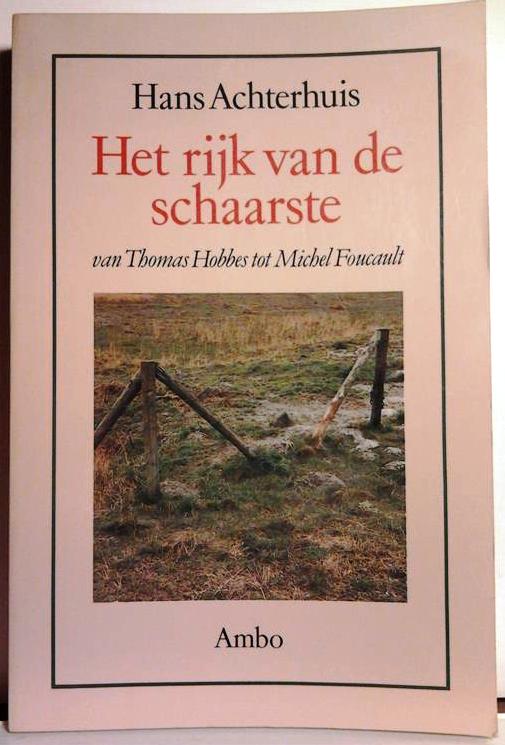
Baarn
Ambo
1988
INT 
condition: Aanduidingen in fluo en potlood
book number: 201512280003
Het rijk van de schaarste van Thomas Hobbes tot Michel Foucault
Paperback, in-8, 365 pp., illustraties, bibliografische noten, bibliografie, index/register.
Opbouw:
I. Thomas Hobbes,
II. John Locke,
III. Jean-Jacques Rousseau,
IV. Karl Marx,
V. Michel Foucault
VI. Schaarste en gezondheidszorg. Grenzeloze groei.
VII. Honger: het verborgen geweld.
A. citeert op p. 342 Franz Fanon (Les damnés de la terre - 1961) en zijn waarschuwing opdat Afrika niet het westerse maatschappijmodel zou naäpen.
A. komt uit op een visie waar 'genoeg' het sleutelwoord is en stelt dat tegen overproductie en overconsumptie.
Hij brengt de plechtige belofte van de Wereld Voedsel Conferentie van 1974 in herinnering: 'dat binnen tien jaar geen kind met honger naar bed zal gaan, en geen gezin meer zal hoeven te vrezen dat het de volgende dag geen eten krijgt, en dat van geen enkel menselijk wezen de toekomst en de capaciteiten verminkt zullen worden door ondervoeding.' (p. 345)
Noot LT: Jean Ziegler weet het gebalder te formuleren: 'Elk kind dat vandaag van honger sterft, wordt vermoord.'
Opbouw:
I. Thomas Hobbes,
II. John Locke,
III. Jean-Jacques Rousseau,
IV. Karl Marx,
V. Michel Foucault
VI. Schaarste en gezondheidszorg. Grenzeloze groei.
VII. Honger: het verborgen geweld.
A. citeert op p. 342 Franz Fanon (Les damnés de la terre - 1961) en zijn waarschuwing opdat Afrika niet het westerse maatschappijmodel zou naäpen.
A. komt uit op een visie waar 'genoeg' het sleutelwoord is en stelt dat tegen overproductie en overconsumptie.
Hij brengt de plechtige belofte van de Wereld Voedsel Conferentie van 1974 in herinnering: 'dat binnen tien jaar geen kind met honger naar bed zal gaan, en geen gezin meer zal hoeven te vrezen dat het de volgende dag geen eten krijgt, en dat van geen enkel menselijk wezen de toekomst en de capaciteiten verminkt zullen worden door ondervoeding.' (p. 345)
Noot LT: Jean Ziegler weet het gebalder te formuleren: 'Elk kind dat vandaag van honger sterft, wordt vermoord.'
ACHTERHUIS Hans Prof. Dr@ wikipedia
€ 7.0
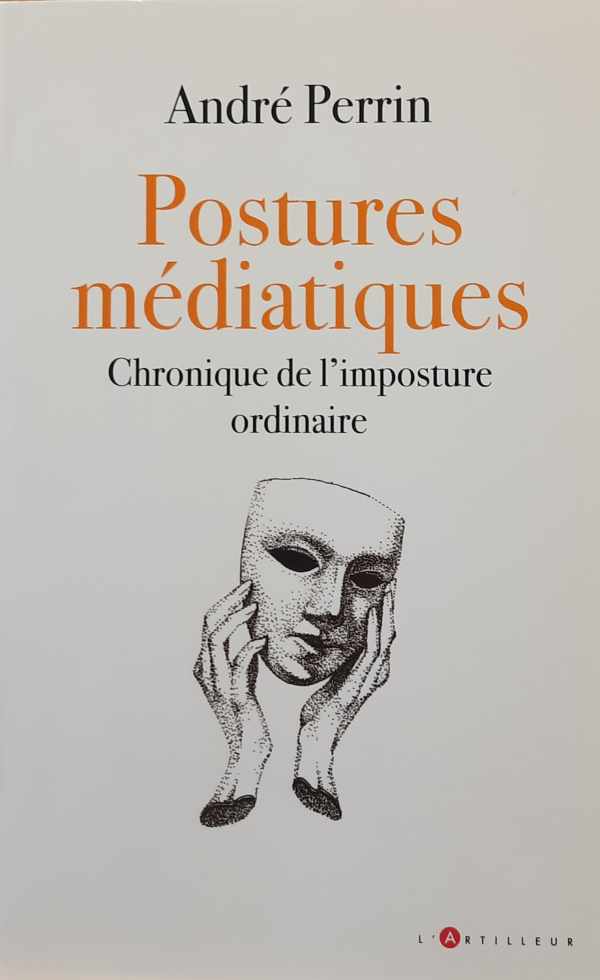
Paris
L'artilleur
2022
FRA 
condition: Very good/Très bel état/Sehr gut/Zeer goed
book number: 202404111716
Postures médiatiques - Chronique de l'imposture ordinaire
Broché, in-8, 216 pp., index.
Comme il l'avait fait dans ses précédents ouvrages, le philosophe André Perrin reprend ici la transcription détaillée de sa « revue de presse » quotidienne.Il confronte les assertions de nos journalistes préférés avec le réel, les faits vérifiés.Et le résultat est effrayant. Nous sommes bien à l'époque du dilettantisme, caché derrière un militantisme effréné.
Agrégé de philosophie, André Perrin a enseigné dans le nord de la France, en Andorre et en classes préparatoires aux grandes écoles à Montpellier. Il a aussi exercé les fonctions d'Inspecteur d'Académie - inspecteur pédagogique régional de philosophie.Il est l'auteur de Scènes de la vie intellectuelle en France (L'Artilleur, 2016) et de Journal d'un indigné (L'Artilleur, 2018).
Comme il l'avait fait dans ses précédents ouvrages, le philosophe André Perrin reprend ici la transcription détaillée de sa « revue de presse » quotidienne.Il confronte les assertions de nos journalistes préférés avec le réel, les faits vérifiés.Et le résultat est effrayant. Nous sommes bien à l'époque du dilettantisme, caché derrière un militantisme effréné.
Agrégé de philosophie, André Perrin a enseigné dans le nord de la France, en Andorre et en classes préparatoires aux grandes écoles à Montpellier. Il a aussi exercé les fonctions d'Inspecteur d'Académie - inspecteur pédagogique régional de philosophie.Il est l'auteur de Scènes de la vie intellectuelle en France (L'Artilleur, 2016) et de Journal d'un indigné (L'Artilleur, 2018).
André Perrin (enseignant.)@ wikipedia
€ 15.0
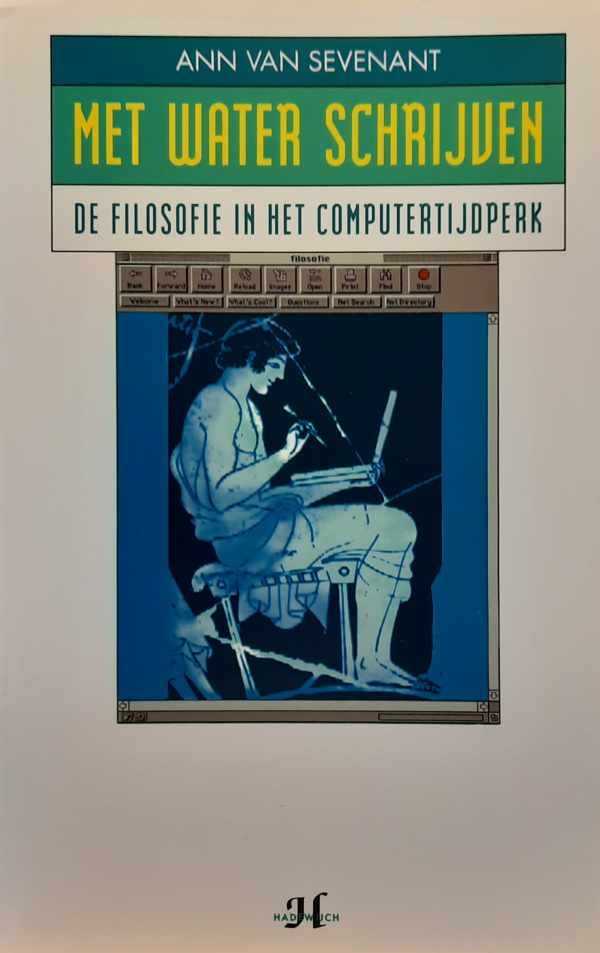
Antwerpen
Hadewijch
1997
BEL 
condition: Very good/Très bel état/Sehr gut/Zeer goed
book number: 202404111710
Met water schrijven - de filosofie in het computertijdperk
Paperback, in-8, 165 pp.
Ann van Sevenant@ wikipedia
€ 15.0

The social contract. A personal inquiry into the evolutionary sources of order and disorder
Hardcover, sewn, 8vo, 405 pp., index, bibliography, drawings by Berdine Ardrey
ARDREY Robert@ wikipedia
€ 10.0

Utrecht/Antwerpen
Aula
1965
DEU 
condition: Goed/Bon état/Good/Gut
book number: 202401300201
De Revolutie, macht en onmacht van een modern politiek verschijnsel (vertaling van On Revolution - 1963)
Pocket, 352 pp., bibliografische noten, register.
Er zijn slechts twee polen op het historische continuüm: vrijheid en tirannie.
Hannah Arendt (Linden bij Hannover, 14 oktober 1906 – New York, 4 december 1975) was een Duits-Amerikaans Joods filosofe en politiek denker, die uit Duitsland vluchtte voor het nationaalsocialisme en de Jodenvervolging en zich met name verdiepte in totalitaire politieke systemen.
Er zijn slechts twee polen op het historische continuüm: vrijheid en tirannie.
Hannah Arendt (Linden bij Hannover, 14 oktober 1906 – New York, 4 december 1975) was een Duits-Amerikaans Joods filosofe en politiek denker, die uit Duitsland vluchtte voor het nationaalsocialisme en de Jodenvervolging en zich met name verdiepte in totalitaire politieke systemen.
ARENDT Hannah@ wikipedia
€ 15.0
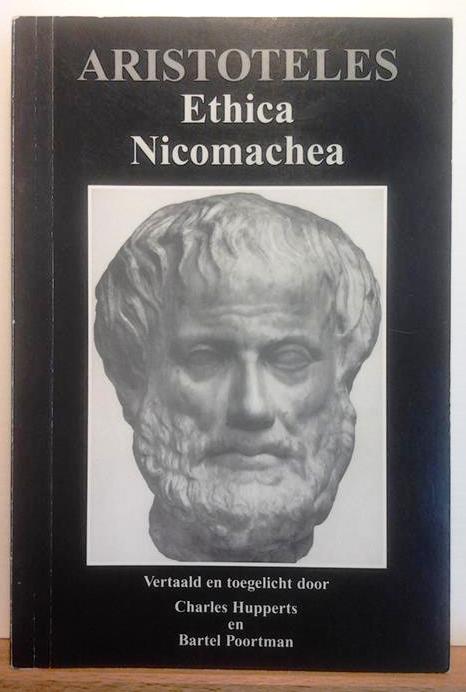
Amsterdam
Kallias
1997
GRC
condition: Very good/Très bel état/Sehr gut/Zeer goed
book number: 201604271702
Ethica Nicomachea
 Pb, in-8, 428 pp. Vertaald ingeleid en van aantekeningen voorzien door Charles Hupperts en Bartel Poortman.
Pb, in-8, 428 pp. Vertaald ingeleid en van aantekeningen voorzien door Charles Hupperts en Bartel Poortman.
ARISTOTELES@ wikipedia
€ 20.0
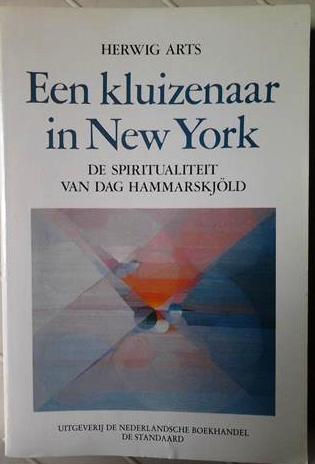
Antwerpen
De Nederlandsche Boekhandel
1986
BEL 
condition: Very good/Très bel état/Sehr gut/Zeer goed
book number: 202109100323
Een kluizenaar in New York. De spiritualiteit van Dag Hammarskjöld.
pb, 8vo, 161 pp.
ARTS Herwig@ wikipedia
€ 20.0

Leuven
Davidsfonds
1990
INT 
condition: Goed/Bon état/Good/Gut
book number: 19900024
De lange reis naar binnen
Paperback 207 pp.
ARTS Herwig@ wikipedia
€ 10.0

Brussel
De Morgen
2005
INT 
condition: As new/comme neuf/wie neu/als nieuw
book number: 20050163
Hume
Hardcover, in-8, 136 pp., Reeks 'Kopstukken filosofie'. Nr 9
AYER A.J.@ wikipedia
€ 15.0
De een is de ander - de relatie tussen mannen en vrouwen
Pocket, 320 pp., bibliografische noten, bibliografie.
Beweegt zich op de grens tussen filosofie en sociaal-psychologie.
Volgens Badinter zullen mannen en vrouwen steeds meer op elkaar gaan lijken.
Beweegt zich op de grens tussen filosofie en sociaal-psychologie.
Volgens Badinter zullen mannen en vrouwen steeds meer op elkaar gaan lijken.
BADINTER Elisabeth@ wikipedia
€ 10.0
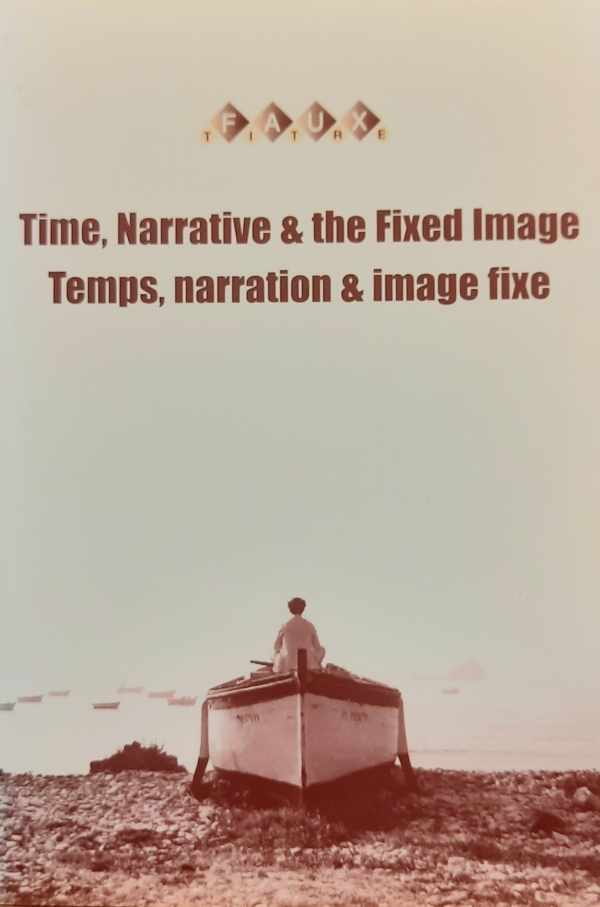
Amsterdam/Atlanta
Rodopi
2001
FRA 
condition: Very good/Très bel état/Sehr gut/Zeer goed
book number: 202404161751
Temps, Narration Et Image Fixe
Broché, in-8, 272 pp., Bibliography, Illustrations
"The various essays discuss paintings, the illustrated covers of books, comics or graphic novels, photo-stories, postcards, television and video art, as well as aesthetic practices that defy categorization..."--back cover.
"The various essays discuss paintings, the illustrated covers of books, comics or graphic novels, photo-stories, postcards, television and video art, as well as aesthetic practices that defy categorization..."--back cover.
BAETENS Jan@ wikipedia
€ 15.0

Europese geest. Inhouden en vormen van het cultuurleven der Europese wereld
Softcover, pb, 8vo, 372 pp.
BANNING W., BIERENS DE HAAN J.D.@ wikipedia
€ 10.0

Brussel
De Morgen
2005
GRC
condition: As new/comme neuf/wie neu/als nieuw
book number: 20050157
Aristoteles
Hardcover, in-8, 158 pp., Reeks 'Kopstukken filosofie'. Nr 3
BARNES Jonathan@ wikipedia
€ 15.0

Zoetermeer
Klement
2018
NLD 
condition: Very good/Très bel état/Sehr gut/Zeer goed
book number: 202404111700
Vloeibare tijden - leven in een eeuw van onzekerheid
Paperback, in-8, 149 pp., bibliografische noten
BAUMAN Zygmunt@ wikipedia
€ 15.0
De strijd tusschen idealisme en naturalisme in de 19e eeuw.
Hardcover, gebrocheerd, 8vo, 224 pp, index, bibliografie
BIERENS DE HAAN Dr J.D.@ wikipedia
€ 10.0

Bezwaren tegen het humanisme
Pocket, 158 pp.
BLACKHAM, HEPBURN, KNOTT, MARTIN@ wikipedia
€ 10.0

Kapellen
Pelckmans
1991
BEL 
condition: Ex-library. Usual stamps. Good.
book number: 19910193
Resonanties
Pb met flappen, in-8, 157 pp. Gesigneerd door de auteur.
BODIFEE GERARD@ wikipedia
€ 15.0

Kapellen
DNB/Pelckmans.
1987
BEL 
condition: good
book number: 19870195
Het vreemde van de aarde. Strakke natuurwetten en onberekenbaar leven.
2de druk. Pb, 181 pp.
BODIFEE Gerard@ wikipedia
€ 10.0
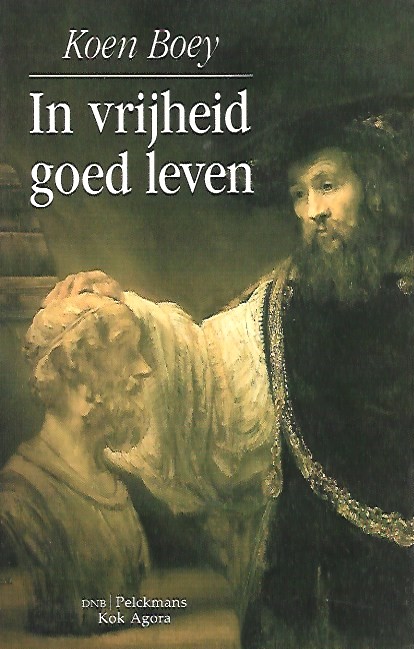
Kapellen/Kampen
DNB
1992
BEL 
condition: Very good
book number: 201803092241
In vrijheid goed leven. Een proeve van fundamentele ethiek
Pb, 14x22cm, 163 pp. Boey (Brugge, 1934) doctoreerde aan de Sorbonne op de vervreemding bij Hegel.
In het spoor van Hegel trachten ethici vandaag tot een goed begrepen vrijheidsopvatting te komen. In het licht van die vrijheidsidee willen ze de zin omschrijven die de mens in zijn leven kan realiseren.
Het eeuwige "waarom leven wij ?".
Van pagina 106: "De hedendaagse mens is eerst en vooral door objecten omgeven en hij staat vooral in relatie tot deze objecten, eerder dan dat hij in relatie staat tot andere mensen."
Commentaar LT (2018): In 1992 kon Koen Boey niet vermoeden welke vlucht het internet en met name Facebook zou nemen. Dus moeten we vandaag de vraag stellen: zijn de andere mensen met wie we via Facebook een relatie hebben objecten of misschien wel virtuele verpakkingen van mensen? Hebben de verpakkingen enig of helemaal geen verband met hun inhoud? Wanneer het waar zou zijn dat verpakkingen mekaar bejegenen in een wereld van schimmen ('fake people'), hoe is het dan gesteld met de achterliggende eenzaamheid en het gemis aan wérkelijk contact?
In het spoor van Hegel trachten ethici vandaag tot een goed begrepen vrijheidsopvatting te komen. In het licht van die vrijheidsidee willen ze de zin omschrijven die de mens in zijn leven kan realiseren.
Het eeuwige "waarom leven wij ?".
Van pagina 106: "De hedendaagse mens is eerst en vooral door objecten omgeven en hij staat vooral in relatie tot deze objecten, eerder dan dat hij in relatie staat tot andere mensen."
Commentaar LT (2018): In 1992 kon Koen Boey niet vermoeden welke vlucht het internet en met name Facebook zou nemen. Dus moeten we vandaag de vraag stellen: zijn de andere mensen met wie we via Facebook een relatie hebben objecten of misschien wel virtuele verpakkingen van mensen? Hebben de verpakkingen enig of helemaal geen verband met hun inhoud? Wanneer het waar zou zijn dat verpakkingen mekaar bejegenen in een wereld van schimmen ('fake people'), hoe is het dan gesteld met de achterliggende eenzaamheid en het gemis aan wérkelijk contact?
BOEY Koen@ wikipedia
€ 7.5

Leusden
ISVW Uitgevers
2014
NLD 
condition: Very good/Très bel état/Sehr gut/Zeer goed
book number: 202404111648
Sterven is doodeenvoudig. Iedereen kan het / druk 1 - Wim Brands in gesprek met Rene Gude
Paperback, in-8, 60 pp.
Interview met de Nederlandse filosoof (1957) naar aanleiding van zijn terminale ziekte, waarin hij op zeer persoonlijke wijze mijmert over leven in 'geleende' tijd.
Interview met de Nederlandse filosoof (1957) naar aanleiding van zijn terminale ziekte, waarin hij op zeer persoonlijke wijze mijmert over leven in 'geleende' tijd.
BRANDS Wim@ wikipedia
€ 15.0
We found 3 news items
The killing of Christians in Nigeria
ID: 202001311486
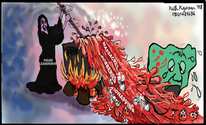
It is of grave danger to pretend not to see it, keep quiet over it or try to be nice about it and water it down. Many evidences point to it – Christians are hunted down in Northern Nigeria. The biggest symbols of this sad truth are the remaining over 100 Chibok schoolgirls, Dapchi schoolgirl, Leah Sharibu and others in the den of the Boko Haram terrorists.
Killings and abductions are on the rise. On January 8, 2020, an armed gang dressed in military uniforms forced its way into the Catholic Good Shepherd Seminary located off Abuja-Kaduna-Zaria Express Way, home to some 268 seminarians, and abducted four first-year philosophy students: Pius Kanwai, 19; Peter Umenukor, 23; Stephen Amos, 23; and Michael Nnadi, 18.
One of the abducted students was later dumped along Kaduna-Abuja highway because the abductors felt he would not survive given the type of injuries they inflicted on him.
Then on January 9, 2020, Dachiya Dalep, a student of the University of Maiduguri, was abducted on his way to school from Jos. Twelve days later the gory video of his gruesome execution surfaced by Boko Haram. The father of the executed Dalep said the killing of his son cannot force his family to renounce Christianity.
Another gory incident was the beheading of the abducted Chairman of the Christian Association of Nigeria, CAN, in Michika Local Government Area of Adamawa State, Rev. Lawan Andimi. The terrorists had demanded two million Euros ransom but were offered N50 million, which they rejected before beheading Rev. Andimi and sending the gory picture of his killing to the President of the EYN Church, Reverend Daniel Mbaya.
Just the Sunday before Rev. Andimi's beheading, another clergyman, Rev. Denis Bagauri, was murdered by gunmen in his residence at Mayo Belwa of Adamawa. The list is growing.
In 2017, the United States House of Representatives had cited Nigeria as the most dangerous place for Christians in the world. In December last year, the U.S. authorities reacted again by placing Nigeria on a Special Watch List for tolerating "severe violations of religious freedom", saying sectarian violence increased in 2018.
Before that, former President, Olusegun Obasanjo, in January 2019, alleged that Boko Haram was being "empowered" by the Federal Government. And CAN, along with other Christian groups, has accused the Federal Government of not doing enough to stop these evil acts.
We call on the Federal Government to protect Nigerians irrespective of their faith. There is no way that Christianity or any other faith can be uprooted from Northern Nigeria. Those who have made it their agenda must be ruthlessly pursued and uprooted instead.
The world should help.
Unless this is done the entire West African sub-region could be consumed by unending and unwinnable sectarian conflicts.
VANGUARD
Land: NGA

Achieving Our Country - Leftist Thought in Twentieth-Century America
ID: 199908270286
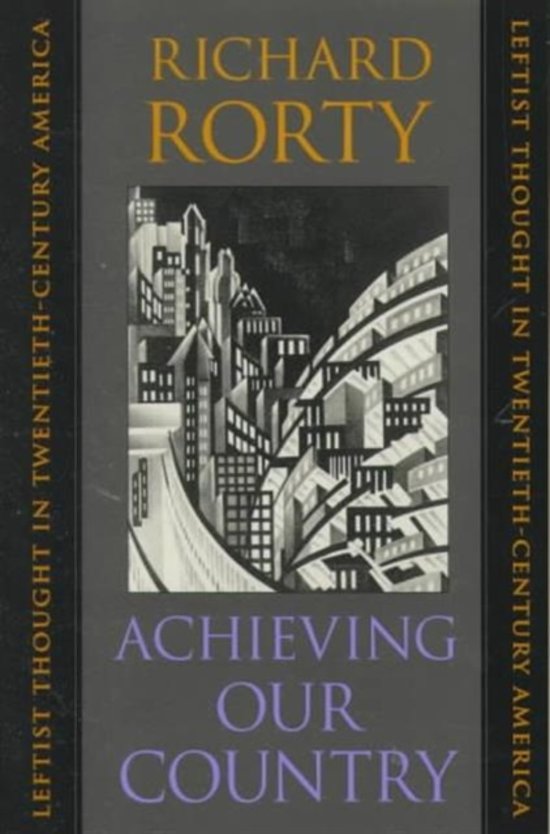
Must the sins of America's past poison its hope for the future? Lately the American Left, withdrawing into the ivied halls of academe to rue the nation's shame, has answered yes in both word and deed. In Achieving Our Country, one of America's foremost philosophers challenges this lost generation of the Left to understand the role it might play in the great tradition of democratic intellectual labor that started with writers like Walt Whitman and John Dewey. How have national pride and American patriotism come to seem an endorsement of atrocities--from slavery to the slaughter of Native Americans, from the rape of ancient forests to the Vietnam War? Achieving Our Country traces the sources of this debilitating mentality of shame in the Left, as well as the harm it does to its proponents and to the country. At the center of this history is the conflict between the Old Left and the New that arose during the Vietnam War era. Richard Rorty describes how the paradoxical victory of the antiwar movement, ushering in the Nixon years, encouraged a disillusioned generation of intellectuals to pursue High Theory at the expense of considering the place of ideas in our common life. In this turn to theory, Rorty sees a retreat from the secularism and pragmatism championed by Dewey and Whitman, and he decries the tendency of the heirs of the New Left to theorize about the United States from a distance instead of participating in the civic work of shaping our national future. In the absence of a vibrant, active Left, the views of intellectuals on the American Right have come to dominate the public sphere. This galvanizing book, adapted from Rorty's Massey Lectures of 1997, takes the first step toward redressing the imbalance in American cultural life by rallying those on the Left to the civic engagement and inspiration needed for achieving our country.
REVIEWS
Richard Rorty [is] John Dewey's ablest intellectual heir and one of the most influential philosophers alive...In lively prose, [Achieving Our Country] offers a pointed and necessary reminder that left academics have too often been content to talk to each other about the theory of hegemony while the right has been busy with the practice of it. If those criticized in the book dismiss it the way they brush aside the Blooms and D'Souzas of the world, an opportunity will be lost. Rorty invites a serious conversation about the purposes of intellectual work and the direction of left politics. I wouldn't want him to have the last word, but the conversation should be joined. If it is conducted with the verve of Achieving Our Country, and if it shares Rorty's genuine commitment to revitalizing the left as a national force, it will be a very good thing. The Nation There is much to be debated, much that will probably infuriate, in Rorty's picture of contemporary Left intellectuals... Achieving Our Country is meant to be pointedly polemical, and Rorty...[has] succeeded at stirring up emotions as well as thoughts. -- Vincent J. Bertolini American Literature In his philosophically rigorous new book, Achieving Our Country, Richard Rorty raises a provocative if familiar question: Whatever happened to national pride in this country?...[and] he offers a persuasive analysis of why such pride has been lost. -- Christopher Lehmann-Haupt New York Times Achieving Our Country is an appeal to American intellectuals to abandon the intransigent cynicism of the academic, cultural left and to return to the political ambitions of Emerson, Dewey, Herbert Croly and their allies. What Rorty has written--as deftly, amusingly and cleverly as he always writes--is a lay sermon for the untheological...[Americans] do not need to know what God wants but what we are capable of wanting and doing...[Rorty argues] that we would do better to try to improve the world than lament its fallen condition. On that he will carry with him a good many readers. -- Alan Ryan New York Times Book Review [In this] slim, elegantly written book...Rorty scolds other radical academics for abandoning pride in the nation's democratic promise; in their obsession with 'victim studies,' he argues, they have neglected to inspire the 'shared social hope' that motivated every mass movement against injustice from the abolitionists to the voting rights campaign. -- Michael Kazin Washington Post Book World The heart of Achieving Our Country is Professor Rorty's critique of the cultural left. Barricaded in the university, this left has isolated itself, he asserts, from the bread-and-butter issues of economic equality and security and the practical political struggles that once occupied the reform tradition...Controversies are seeded like land mines in every paragraph of this short book. -- Peter Steinfels New York Times Mr. Rorty calls for a left which dreams of achieving America, a patriotic left he recognises from the days of the New Deal and which he remembers from the early 1960s when, for example, people campaigned for civil-rights laws to make their country better. Where, he wonders, has such reformist pride gone? In place of Marxist scholasticism , Mr. Rorty wants a left which makes reducing inequalities part of a civic religion . Yet material differences are not the only sort of thing that bothers Mr. Rorty about the contemporary United States. On a communitarian note, he argues that the civic religion he advocates should include commitment to shared values that rise above ethnic or minority loyalties. The Economist Richard Rorty's Achieving Our Country is short, comprehensible and urges a civic and political agenda--the re-engagement of the Left...Rorty seeks to revive the vision of Walt Whitman and John Dewey, and what he sees as the real American Dream--a compassionate society held together by nothing more absolute than consensus and the belief that humane legal and economic agreements stand at the centre of democratic civilisation. -- Brian Eno The Guardian, Featured in the Books of the Year issue for 1998 A succinct, stimulating, crisply written book...Rorty proposes a return to the liberal values that animated American reform movements for the first two-thirds of this century: from the long struggle of labor unions to obtain better conditions for workers, to the efforts of leaders like Woodrow Wilson, Theodore and Franklin Roosevelt, John Kennedy, and Lyndon Johnson to redistribute the nation's wealth more equitably...Although Rorty is an academic philosopher, in this book, addressed to the general reader, he employs clear, vigorous language that makes reading a pleasure rather than a chore. -- Merle Rubin Christian Science Monitor Rorty made us realise how much poorer we are if Jefferson, Emerson, Whitman, Thoreau, Stowe, Peirce, William James, Santayana and Dewey are not familiar landmarks in our intellectual scenery...If we [scoff] at Rorty's patriotic American leftism, we may find that it sets off some doubts that will come back to haunt us. When we quibble over his interpretations of our favourite thinkers, are we not confirming his stereotype of left pedantry? When we sniff at him for keeping company with rightists and renegades, do we not bear out his idea of a Left that is keener on its own purity than on fighting for the poor? As we look down our noses at the etiolation of socialism in America, should we not reckon the costs and benefits of European mass movements, and reflect on the political history of the anti-Americanism that comes to us so easily? Before leftist subjects of Her Majesty get snooty about American democracy, we might stop and wonder whose interests are served by our unshakable optimism about the past. The unguarded naiveties of Achieving Our Country are not quite as negligent as they look, and the book may well turn out to be one of the first signs of a long-delayed breaking of the ice in socialist politics following the end of the Cold War. The fact that Rorty's old-style American leftism is closer to British New Labour than to good old socialism may prove not that he is confused, but that it is time to reset our political chronometers. -- Jonathan Ree London Review of Books Achieving Our Country criticizes academic theorists and reminds us that left-wing reformers in previous periods of American history either made their careers outside the university or, at least, developed strong links with the decidedly non-academic labor movement...Rorty's distinction between a 'cultural Left' and a reformist Left is useful. As Freud replaced Marx in the imagination of academic theorists, Rorty explains, a cultural left--one that thinks more about stigma than about money, more about deep and hidden psychosexual motivations than about shallow and evident greed --came into being. -- Alan Wolfe The Chronicle of Higher Education Richard Rorty is considered by many to be America's greatest living philosopher. That assessment is firmly supported in this short, profound, and lucid volume. In Achieving Our Country, Rorty does what many of us think philosophers ought to do, namely, lay a foundation and establish a framework within which we as individuals and as a society can conceptualize and fashion operational theories by which to live and prosper together...I can think of no more important book that I have read in recent years or one that I could more fervently recommend to the readers of this journal that Rorty's Achieving Our Country. -- Thomas R. DeGregori Journal of Economic Issues For many years now, Rorty has been one of the most important American pragmatists, defending the experimental modes of inquiry first propounded by John Dewey from both traditionalists and postmodernists...In Achieving Our Country, a brief but eloquent book, Rorty begs his academic colleagues to return to the real world. I am nostalgic for the days, he writes, 'when leftist professors concerned themselves with issues in real politics (such as the availability of health care to the poor and the need for strong labor unions) rather than with academic politics. -- Jefferson Decker In These Times Rorty offers a resolute defense of pragmatic and reformist politics, coupled with a sophisticated rereading of the history of 20th-century American leftist thought. The result is a book that ends up reaffirming the great achievements of American left liberalism--strong unions, Social Security, and the principled regulation of corporate power--even as it illuminates the ways in which the cultural myopia of today's academic left has placed those achievements in jeopardy...In his insistence that there is a great American tradition of leftist reform, and that this rendition can be reinvigorated only by a return to the idea of the nation, Rorty has constructed as humane and as hopeful a defense of patriotism as one can imagine. -- James Surowiecki Boston Phoenix Rorty's new book urges a return to American liberalism's days of hope, pride, and struggle within the system...Subtle without being dense, good-natured in its defiance of a whole spectrum of conventional wisdoms, Achieving Our Country is a rare book. It should be compulsory reading--if that weren't contrary to all it stands for. -- Richard Lamb The Reader's Catalog A deeply considered diagnosis, a vital set of prophecies. Publishers Weekly Richard Rorty is remarkable not just for being a gadfly to analytical philosophers, but for his immense reading, his lively prose and his obvious moral engagement with the issues...The conversation of philosophy would be much poorer without him...Achieving Our Country is a valuable addition to Rorty's writings...He has things to say that are important and timely...They are said powerfully. -- Hilary Putnam Times Literary Supplement It is refreshing to find so hard-hitting a portrait of the contemporary academic Left in the work of one of its own. -- Peter Berkowitz Commentary Richard Rorty is an inspirational writer who makes a valiant effort in this book to create an atmosphere of cooperation among those he characterizes as he Reformist Left. He wants us to return to the ideals of John Dewey and Walt Whitman and achieve the greatness that is possible in a country of our wealth and dominance. -- Edward J. Bander Bimonthly Review of Law Books A bracing tonic against the jejune profundities and the self-centered talking points by the far Right that find their way into the media. In sharply etched arguments Rorty weaves in philosophical and historical perspectives...His message isn't one of resignation, rather of hope grounded in the Left's potential for reinventing itself. He thinks it's time for the Left to stop demonizing capitalist America and to develop once again a political program of its own. -- Terry Doran Buffalo News On behalf of countless readers whose reaction to most left academic writing over the past two decades has increasingly been not so much either agreement or disagreement as an overpowering sense of So what?, the eminent philosopher Richard Rorty has composed a marvelous philippic against the entrenched irrelevance of much of the American left...Rorty's most important insight is into the political worldview of the academic left: that it is essentially nonpolitical...He offers a withering comparison of the core beliefs of the current cultural left with those of one of its forebears, Walt Whitman. -- Harold Meyerson Dissent Achieving our country (the phrase is culled from James Baldwin's The Fire Next Time) isn't just a redeemable aim, it's what good radical politics has always been about. -- Gideon Calder Radical Philosophy Politically progressive academics should consider carefully Rorty's arguments...They pose important questions about American politics and public intellectual practice. -- Harvey Kaye Times Higher Educational Supplement
Land: USA

MILL John Stuart (1806-1873): politieke economie, vrijheid en gezag
ID: 180605204545
John Stuart Mill (20 mei 1806 – 8 mei 1873) was een Engels filosoof en econoom, en de meest invloedrijke vrije denker van de 19e eeuw. Hij was een voorstander van het utilitarisme, de ethische theorie die voorgesteld werd door zijn peetvader Jeremy Bentham.
John Stuart Mill werd geboren in zijn vaders huis in Pentonville, Londen, als de oudste zoon van James Mill. Hij kreeg zijn onderwijs van zijn vader, met advies en assistentie van Jeremy Bentham en Francis Place. Hij kreeg een strenge opvoeding en werd nadrukkelijk afgeschermd van andere jongens van zijn leeftijd. Zijn vader, een navolger van Bentham, had als zijn specifieke doel om een genieus intellect te creëren dat de doelen en uitvoering van het utilisme zou doen verder leven na de dood van Bentham en hemzelf.
Tegen de tijd dat hij drie was kon hij het Griekse alfabet opnoemen, en toen hij acht werd had hij Aesopus' 'Fabels' gelezen en wist hij van Plato. In 1818 begon hij aan een studie logica en het jaar erop kreeg hij te maken met politieke economie.
Hij publiceerde zijn eerste belangrijke boek in 1842, The system of logic. Een van de belangrijkste theorieën is het beginsel van causaliteit – Als A altijd door B wordt gevolgd, kan worden verondersteld dat dit in de toekomst ook altijd zo zal zijn.
In 1869 publiceerde hij Subjection of Women, waarin hij de vrouwenrechten verdedigde. Hij was dan al vier jaar parlementslid waar hij eveneens ijverde voor het vrouwenkiesrecht en de vooruitstrevende liberalen steunde. Zijn vrouw Henriëtte, die in 1858 stierf, zou het boek geschreven hebben, maar op haar naam mocht het niet worden uitgegeven. Tot op de dag van vandaag staat het boek officieel op naam van John Stuart Mill.
http://nl.wikipedia.org/wiki/John_Stuart_Mill (20070226)
Writings by John Stuart Mill
[books / book excerpts]
· The Logic of the Moral Sciences. Excerpted from A System of Logic. London, 1843, 8th ed. 1872. [French translation]
· Essays on Some Unsettled Questions of Political Economy. London, 1844.
· Principles of Political Economy. London, 1848, 7th ed. 1871.
· On Liberty. London, 1859. [French translation]
· Dissertations and Discussions. London, 1859, 4th ed. 1882.
· Considerations on Representative Government. London, 1861.
· Utilitarianism. London, 1863. Reprinted from Fraser's Magazine, 1861. [French translation]
· Auguste Comte and Positivism. London, 1865. Reprinted from Westminster Review, 1865. [French translation]
· An Examination of Sir Hamilton's Philosophy. London, 1865.
· The Subjection of Women. London, 1869. [French translation] [Spanish translation]
· Autobiography. London, 1873. [French translation]
· Three Essays on Religion [Nature + Utility of Religion + Theism]. London, 1874.
· Chapters on Socialism. Fortnightly Review, 1879.
[articles]
· Free Discussion (1). Morning Chronicle, 1823.
· Free Discussion (2). Morning Chronicle, 1823.
· Free Discussion (3). Morning Chronicle, 1823.
· A Defense of Bentham. Excerpted from 'Whewell on Moral Philosophy'. Westminster Review, 1836.
· Note on N. W. Senior's Political Economy. In Senior's Outline of the Science of Political Economy, London, 1836.
· The Negro Question. Fraser's Magazine, 1850.
· Bentham. 1838, 2nd ed. 1859.
· The Contest in America. Fraser's Magazine, 1862.
· Inaugural Address. Delivered to the University of St. Andrews, 1867.
· Meetings in Royal Parks. Delivered in Parliament, 1867.
· Speech in Favour of Capital Punishment. Delivered in Parliament, 1868.
· Thornton on Labour and its Claims. Fortnightly Review, 1869.
· Theism. In Three Essays on Religion, London, 1874.
· Nature. In Three Essays on Religion, London, 1874.
· Utility of Religion. In Three Essays on Religion, London, 1874.
[letters]
· To James Mill. April 25, 1821.
· To ? March 18, 1840.
· To Gustave D'Eichthal. January 10, 1842.
· To ? May 13, 1865.
· To a Gentleman in Ohio. September 1, 1865.
--------------------------------------------------------------------------------
Writings about John Stuart Mill
[dictionary / encyclopaedia entries]
· John Stuart Mill. The Cambridge History of English and American Literature.
· John Stuart Mill. The Columbia Encyclopedia.
· John Stuart Mill. The Concise Encyclopedia of Economics.
· John Stuart Mill. Encyclopædia Britannica.
· John Stuart Mill. Encyclopædia Britannica (1911).
· John Stuart Mill. Internet Encyclopedia of Philosophy.
· John Stuart Mill. Island of Freedom.
· John Stuart Mill. The Johns Hopkins Guide to Literary Theory & Criticism.
· John Stuart Mill. The Literary Encyclopedia.
· John Stuart Mill. The Penguin Dictionary of Philosophy.
· John Stuart Mill. Spartacus Educational.
· John Stuart Mill. The Stanford Encyclopedia of Philosophy.
· John Stuart Mill. Wikipedia.
[other writings]
· Law Reform in England. The United States Democratic Review, 1851.
· John Stuart Mill and his Residence. Anonymous. Littell's Living Age, 1868.
· John Stuart Mill. By G. M. Towle. Appleton's Journal, 1870.
· John Stuart Mill. By M. D. Conway. Harper's New Monthly Magazine, 1873.
· The Reality of Duty. Anonymous. Littell's Living Age, 1876.
· John Stuart Mill (I). By Lyell Adams. New Englander and Yale Review, 1877.
· John Stuart Mill (II). By Lyell Adams. New Englander and Yale Review, 1877.
· John Stuart Mill (III). By Lyell Adams. New Englander and Yale Review, 1877.
· John Stuart Mill and the Destruction of Theism. By President Shairp. Princeton Review, 1878.
· James and John Stuart Mill. Littell's Living Age, 1882.
· John Stuart Mill and the London and Westminster Review. By C. Marion D. Robertson Towers. The Atlantic Monthly, 1892.
· A Letter to John Stuart Mill. By Winthrop More Daniels. The Atlantic Monthly, 1900.
· John Stuart Mill. By Leslie Stephen. In The English Utilitarians. London, 1900, vol. III.
· Variations in the Editions of J. S. Mill's Principles of Political Economy. By M. A. Ellis. Economic Journal, 1906.
· Biography. By O. M. W. Sprague. The Cambridge History of English and American Literature, Cambridge, 1921.
· John Stuart Mill: Traditional and Revisionist Interpretations. By John Gray. Literature and Liberty, 1979.
· Early Buddhism and John Stuart Mill's Thinking. By Vijitha Rajapakse. Philosophy East and West, 1987.
· J. S. Mill: the Utilitarian Influence in the Demise of laissez-faire. By Ellen Frankel Paul. Journal of Libertarian Studies, 1978.
· Wallace's Campaign to Nationalize Land. By M. Gaffney. The American Journal of Economics and Sociology, October 1, 1997.
· Utility and Preferences. By Soshichi Uchii. October 25, 1998.
· The Worm at the Root of the Passions: Poetry and Sympathy in Mill's Utilitarianism. By L. A. Paul. Utilitas, 1998.
· The Carlyle-Mill "Negro Question" Debate. ca. 2000.
· Mill, Liberty, and the Facts of Life. By Shannon C. Stimson and Murray Milgate. 2001.
· Mill's "Proof" of the Principle of Utility. By Geoffrey Sayre-McCord. Social Philosophy and Policy, 2001.
· J.S. Mill and the Diversity of Utilitarianism. By Daniel Jacobson. Philosophers' Imprint, 2003.
· Mill between Aristotle & Bentham. By Martha C. Nussbaum. Daedalus, March 22, 2004.
· The Ethics of Identity. By Kwame Anthony Appiah. The New York Times, June 12, 2005.
· The Influence of Mary Bentham on John Stuart Mill. By Catherine Pease-Watkin. Journal of Bentham Studies, 2006.
· Narrative, Imagination, and the Religion of Humanity in Mill's Ethics. By Colin Heydt. Journal of the History of Philosophy, 2006.
· Mill, Bentham and 'Internal Culture'. By Colin Heydt. British Journal for the History of Philosophy, May, 2006.
[reviews]
· Autobiography. New Englander and Yale Review, 1874.
· Autobiography. New Englander and Yale Review, 1874.
· Autobiography. Scribner's Monthly, 1874.
· Autobiography. North American Review, 1874.
· Autobiography. Littell's Living Age, 1874.
· Autobiography and Three Essays on Religion. New Englander and Yale Review, 1875.
· Considerations on Representative Government. New Englander and Yale Review, 1862.
· Dissertations and Discussions, Vols. I-III. New Englander and Yale Review, 1866.
· Dissertations and Discussions, Vol. IV. New Englander and Yale Review, 1867.
· Dissertations and Discussions, Vol. I. North American Review, 1865.
· Dissertations and Discussions, Vol. IV. North American Review, 1868.
· Examination of Sir Hamilton's Philosophy. New Englander and Yale Review, 1865.
· Inaugural Address at the University of St. Andrew's. North American Review, 1865.
· On Liberty. North America Review, 1863.
· On Liberty. The Cambridge History of English and American Literature, Cambridge, 1921.
· The Philosophy of Auguste Comte. New Englander and Yale Review, 1866.
· Principles of Political Economy. The Prospective Review, 1848.
· Principles of Political Economy. North American Review, 1848.
· Principles of Political Economy. North American Review, 1864.
· Principles of Political Economy. DeBow's Review, 1867.
· Principles of Political Economy. New Englander and Yale Review, 1872.
· Principles of Political Economy. The Cambridge History of English and American Literature, Cambridge, 1921.
· The Subjection of Women. North American Review, 1869.
· The Subjection of Women. New Englander and Yale Review, 1869.
· A System of Logic. North American Review, 1854.
· A System of Logic. The Cambridge History of English and American Literature, Cambridge, 1921.
· Three Essays on Religion. North American Review, 1875.
· Utilitarianism. The Cambridge History of English and American Literature, Cambridge, 1921.
http://www.utilitarian.net/jsmill/ (20070226)
John Stuart Mill werd geboren in zijn vaders huis in Pentonville, Londen, als de oudste zoon van James Mill. Hij kreeg zijn onderwijs van zijn vader, met advies en assistentie van Jeremy Bentham en Francis Place. Hij kreeg een strenge opvoeding en werd nadrukkelijk afgeschermd van andere jongens van zijn leeftijd. Zijn vader, een navolger van Bentham, had als zijn specifieke doel om een genieus intellect te creëren dat de doelen en uitvoering van het utilisme zou doen verder leven na de dood van Bentham en hemzelf.
Tegen de tijd dat hij drie was kon hij het Griekse alfabet opnoemen, en toen hij acht werd had hij Aesopus' 'Fabels' gelezen en wist hij van Plato. In 1818 begon hij aan een studie logica en het jaar erop kreeg hij te maken met politieke economie.
Hij publiceerde zijn eerste belangrijke boek in 1842, The system of logic. Een van de belangrijkste theorieën is het beginsel van causaliteit – Als A altijd door B wordt gevolgd, kan worden verondersteld dat dit in de toekomst ook altijd zo zal zijn.
In 1869 publiceerde hij Subjection of Women, waarin hij de vrouwenrechten verdedigde. Hij was dan al vier jaar parlementslid waar hij eveneens ijverde voor het vrouwenkiesrecht en de vooruitstrevende liberalen steunde. Zijn vrouw Henriëtte, die in 1858 stierf, zou het boek geschreven hebben, maar op haar naam mocht het niet worden uitgegeven. Tot op de dag van vandaag staat het boek officieel op naam van John Stuart Mill.
http://nl.wikipedia.org/wiki/John_Stuart_Mill (20070226)
Writings by John Stuart Mill
[books / book excerpts]
· The Logic of the Moral Sciences. Excerpted from A System of Logic. London, 1843, 8th ed. 1872. [French translation]
· Essays on Some Unsettled Questions of Political Economy. London, 1844.
· Principles of Political Economy. London, 1848, 7th ed. 1871.
· On Liberty. London, 1859. [French translation]
· Dissertations and Discussions. London, 1859, 4th ed. 1882.
· Considerations on Representative Government. London, 1861.
· Utilitarianism. London, 1863. Reprinted from Fraser's Magazine, 1861. [French translation]
· Auguste Comte and Positivism. London, 1865. Reprinted from Westminster Review, 1865. [French translation]
· An Examination of Sir Hamilton's Philosophy. London, 1865.
· The Subjection of Women. London, 1869. [French translation] [Spanish translation]
· Autobiography. London, 1873. [French translation]
· Three Essays on Religion [Nature + Utility of Religion + Theism]. London, 1874.
· Chapters on Socialism. Fortnightly Review, 1879.
[articles]
· Free Discussion (1). Morning Chronicle, 1823.
· Free Discussion (2). Morning Chronicle, 1823.
· Free Discussion (3). Morning Chronicle, 1823.
· A Defense of Bentham. Excerpted from 'Whewell on Moral Philosophy'. Westminster Review, 1836.
· Note on N. W. Senior's Political Economy. In Senior's Outline of the Science of Political Economy, London, 1836.
· The Negro Question. Fraser's Magazine, 1850.
· Bentham. 1838, 2nd ed. 1859.
· The Contest in America. Fraser's Magazine, 1862.
· Inaugural Address. Delivered to the University of St. Andrews, 1867.
· Meetings in Royal Parks. Delivered in Parliament, 1867.
· Speech in Favour of Capital Punishment. Delivered in Parliament, 1868.
· Thornton on Labour and its Claims. Fortnightly Review, 1869.
· Theism. In Three Essays on Religion, London, 1874.
· Nature. In Three Essays on Religion, London, 1874.
· Utility of Religion. In Three Essays on Religion, London, 1874.
[letters]
· To James Mill. April 25, 1821.
· To ? March 18, 1840.
· To Gustave D'Eichthal. January 10, 1842.
· To ? May 13, 1865.
· To a Gentleman in Ohio. September 1, 1865.
--------------------------------------------------------------------------------
Writings about John Stuart Mill
[dictionary / encyclopaedia entries]
· John Stuart Mill. The Cambridge History of English and American Literature.
· John Stuart Mill. The Columbia Encyclopedia.
· John Stuart Mill. The Concise Encyclopedia of Economics.
· John Stuart Mill. Encyclopædia Britannica.
· John Stuart Mill. Encyclopædia Britannica (1911).
· John Stuart Mill. Internet Encyclopedia of Philosophy.
· John Stuart Mill. Island of Freedom.
· John Stuart Mill. The Johns Hopkins Guide to Literary Theory & Criticism.
· John Stuart Mill. The Literary Encyclopedia.
· John Stuart Mill. The Penguin Dictionary of Philosophy.
· John Stuart Mill. Spartacus Educational.
· John Stuart Mill. The Stanford Encyclopedia of Philosophy.
· John Stuart Mill. Wikipedia.
[other writings]
· Law Reform in England. The United States Democratic Review, 1851.
· John Stuart Mill and his Residence. Anonymous. Littell's Living Age, 1868.
· John Stuart Mill. By G. M. Towle. Appleton's Journal, 1870.
· John Stuart Mill. By M. D. Conway. Harper's New Monthly Magazine, 1873.
· The Reality of Duty. Anonymous. Littell's Living Age, 1876.
· John Stuart Mill (I). By Lyell Adams. New Englander and Yale Review, 1877.
· John Stuart Mill (II). By Lyell Adams. New Englander and Yale Review, 1877.
· John Stuart Mill (III). By Lyell Adams. New Englander and Yale Review, 1877.
· John Stuart Mill and the Destruction of Theism. By President Shairp. Princeton Review, 1878.
· James and John Stuart Mill. Littell's Living Age, 1882.
· John Stuart Mill and the London and Westminster Review. By C. Marion D. Robertson Towers. The Atlantic Monthly, 1892.
· A Letter to John Stuart Mill. By Winthrop More Daniels. The Atlantic Monthly, 1900.
· John Stuart Mill. By Leslie Stephen. In The English Utilitarians. London, 1900, vol. III.
· Variations in the Editions of J. S. Mill's Principles of Political Economy. By M. A. Ellis. Economic Journal, 1906.
· Biography. By O. M. W. Sprague. The Cambridge History of English and American Literature, Cambridge, 1921.
· John Stuart Mill: Traditional and Revisionist Interpretations. By John Gray. Literature and Liberty, 1979.
· Early Buddhism and John Stuart Mill's Thinking. By Vijitha Rajapakse. Philosophy East and West, 1987.
· J. S. Mill: the Utilitarian Influence in the Demise of laissez-faire. By Ellen Frankel Paul. Journal of Libertarian Studies, 1978.
· Wallace's Campaign to Nationalize Land. By M. Gaffney. The American Journal of Economics and Sociology, October 1, 1997.
· Utility and Preferences. By Soshichi Uchii. October 25, 1998.
· The Worm at the Root of the Passions: Poetry and Sympathy in Mill's Utilitarianism. By L. A. Paul. Utilitas, 1998.
· The Carlyle-Mill "Negro Question" Debate. ca. 2000.
· Mill, Liberty, and the Facts of Life. By Shannon C. Stimson and Murray Milgate. 2001.
· Mill's "Proof" of the Principle of Utility. By Geoffrey Sayre-McCord. Social Philosophy and Policy, 2001.
· J.S. Mill and the Diversity of Utilitarianism. By Daniel Jacobson. Philosophers' Imprint, 2003.
· Mill between Aristotle & Bentham. By Martha C. Nussbaum. Daedalus, March 22, 2004.
· The Ethics of Identity. By Kwame Anthony Appiah. The New York Times, June 12, 2005.
· The Influence of Mary Bentham on John Stuart Mill. By Catherine Pease-Watkin. Journal of Bentham Studies, 2006.
· Narrative, Imagination, and the Religion of Humanity in Mill's Ethics. By Colin Heydt. Journal of the History of Philosophy, 2006.
· Mill, Bentham and 'Internal Culture'. By Colin Heydt. British Journal for the History of Philosophy, May, 2006.
[reviews]
· Autobiography. New Englander and Yale Review, 1874.
· Autobiography. New Englander and Yale Review, 1874.
· Autobiography. Scribner's Monthly, 1874.
· Autobiography. North American Review, 1874.
· Autobiography. Littell's Living Age, 1874.
· Autobiography and Three Essays on Religion. New Englander and Yale Review, 1875.
· Considerations on Representative Government. New Englander and Yale Review, 1862.
· Dissertations and Discussions, Vols. I-III. New Englander and Yale Review, 1866.
· Dissertations and Discussions, Vol. IV. New Englander and Yale Review, 1867.
· Dissertations and Discussions, Vol. I. North American Review, 1865.
· Dissertations and Discussions, Vol. IV. North American Review, 1868.
· Examination of Sir Hamilton's Philosophy. New Englander and Yale Review, 1865.
· Inaugural Address at the University of St. Andrew's. North American Review, 1865.
· On Liberty. North America Review, 1863.
· On Liberty. The Cambridge History of English and American Literature, Cambridge, 1921.
· The Philosophy of Auguste Comte. New Englander and Yale Review, 1866.
· Principles of Political Economy. The Prospective Review, 1848.
· Principles of Political Economy. North American Review, 1848.
· Principles of Political Economy. North American Review, 1864.
· Principles of Political Economy. DeBow's Review, 1867.
· Principles of Political Economy. New Englander and Yale Review, 1872.
· Principles of Political Economy. The Cambridge History of English and American Literature, Cambridge, 1921.
· The Subjection of Women. North American Review, 1869.
· The Subjection of Women. New Englander and Yale Review, 1869.
· A System of Logic. North American Review, 1854.
· A System of Logic. The Cambridge History of English and American Literature, Cambridge, 1921.
· Three Essays on Religion. North American Review, 1875.
· Utilitarianism. The Cambridge History of English and American Literature, Cambridge, 1921.
http://www.utilitarian.net/jsmill/ (20070226)
Land: GBR





